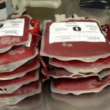Consultant gynecologist and obstetrician at the University Teaching Hospital Dr Mulindi Mwanahamuntu says the hospital is in short supply of blood, a situation which is leading to increased deaths.
And Dr Mwanahamuntu says it is shocking that people in rural areas are more willing to donate blood even though the highest consumers are from the urban areas.
In an interview, Tuesday, Dr Mwanahamuntu lamented that people were not donating blood to their sick relatives.
“It is a precious resource which is in short supply. Part of the reason is that the culture of donating blood is probably not there, we don’t donate blood even to our sick relatives. Very shocking findings from what I am analysing, the hospital resource is in greatest short supply leading to more deaths.[It] is not medicine, but blood. As we move into the festive season, there will be a critical need for blood, there will be a lot of accidents, therefore, there is need for blood transfusions,” Dr Mwanahamuntu said.
Asked how many deaths the hospital had recorded due to loss of blood, Dr Mwanahamuntu said the number could not be estimated.
He, however, said the women’s hospital was the most affected.
“That number cannot be estimated but we can only say women hospitals [are the] most affected. Loss of blood is a leading cause of death especially after child birth and failure to replace the lost blood. There is a delay in replacing the blood which has been lost even if it is found, the damage would have already been caused. There is a lot of evidence that has been published and showing that one of the reasons of maternal death is loss of blood. Villagers donate more blood than town people! For instance, a blood bank can camp at Manda Hill and get 3 pints after 12 hours but it can camp in Kanogo village and get 30 pints in three hours. Town people consume more blood than villagers, the ratio is greater than 20 to 1,” said Dr Mwanahamuntu.













3 Responses
With JWs around, do you expect people to donate blood?
It’s a sad development to learn that blood is scarce in hospitals. Can the hospital try to come up with incentives to encourage people to donate blood. Be aggressive in awareness creation to sensitise the communities.
I remember 11 years ago how i almost died on my sick bed in UTH but God preserved my life through that angel who donated his/her blood at UTH blood bank. Wherever you are, you shall live long and enjoy your life in Jesus name.
Please to everyone, if you are able to donate blood, donate and serve a life